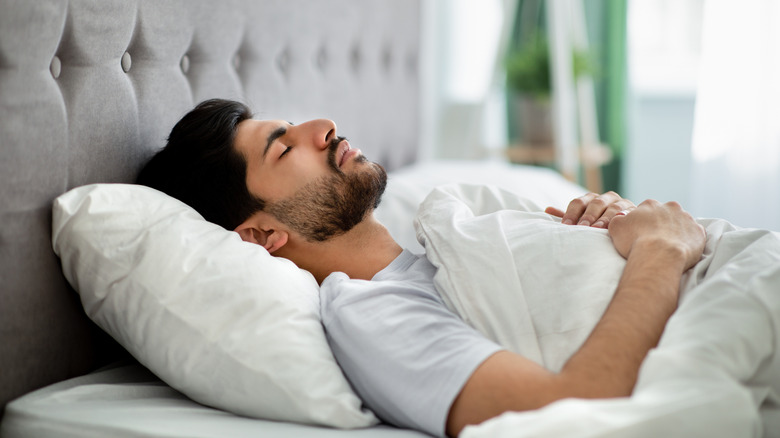The Common Sleep Position That's Been Linked To An Increased Dementia Risk
Maybe you've already mastered the basics of good sleep hygiene. You stop eating a few hours before bed and squeeze in some light yoga to quiet your mind. You keep your bedroom dark and cool, and you steer clear of screens for at least an hour before calling it a night. All of these habits help set the stage for restful, restorative sleep to repair your body and support long-term health.
Insufficient sleep might increase your risk of dementia, but your body position while you sleep may also factor into your risk. While sleeping on your back may help prevent facial wrinkles, it might not be the ideal position if you're trying to support cognitive health.
There are a couple of reasons for this. First, lying on your back can cause the muscles in your airway to relax and may restrict breathing, particularly in people with obstructive sleep apnea (per Houston Methodist). Second, this position might make it harder for your brain to efficiently clear out waste products and toxins during the night, a key process that's thought to help reduce the risk of neurodegenerative diseases like dementia.
Sleeping on your back could affect your brain health
More than half of the people with sleep apnea sleep on their backs, according to a 2014 article in Sleep Medicine Reviews. Sleep apnea can restrict lung volume, and this sleep disorder can also cause people to intermittently stop breathing. As a result, this can disrupt sleep and reduce oxygen to the brain (per Medical News Today). A 2022 meta-analysis in the Journal of Sleep Research found that people with sleep apnea have a 28% higher risk of Alzheimer's and a 54% higher risk of Parkinson's disease.
Alzheimer's disease has been linked to the buildup of harmful proteins. During sleep, your glymphatic system goes to work to remove this waste, but disrupted sleep can also disrupt your brain's glymphatic system. A 2019 study in the Journal of Alzheimer's Disease looked at the sleep patterns of people with a neurodegenerative disease like dementia. The people with neurodegenerative diseases spent more time sleeping on their backs compared to a similar healthy population. The researchers concluded that sleeping on your back may make your glymphatic system less effective compared to sleeping on your side.
Sleeping on your back doesn't directly cause dementia
It's important to note that researchers did not find that sleeping on your back or having sleep apnea directly causes dementia, but they are related. According to the Mayo Clinic, sleep apnea can lead to high blood pressure, type 2 diabetes, and metabolic syndrome. These conditions, in turn, can increase the risk of developing dementia. The Cleveland Clinic estimates that up to 90% of people with sleep apnea are unaware they have the condition. If you wake up several times during the night gasping for air, it's a good idea to talk to a doctor. People with sleep apnea may also experience headaches or dry mouth when they wake up, and sleep apnea may make it difficult to concentrate or stay awake during the day.
If you have back problems that require you to sleep on your back, there are still ways to support your brain's ability to clear out waste during sleep, according to a 2020 review in Brain Sciences. Eating more omega-3-rich foods can reduce brain inflammation and help flush out harmful proteins. Intermittent fasting causes changes in the body that may reduce the buildup in the brain and protect brain cells. On the other hand, moderate to heavy alcohol use can impair the brain's waste-clearing system, so cutting back on alcohol may lower your dementia risk. Regular exercise improves blood flow and supports your brain's natural cleansing processes.


